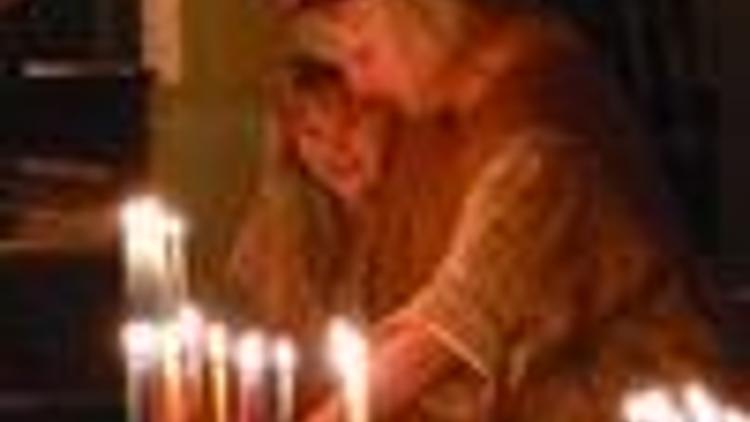Light festival ’Hanukkah,’eight-day Jewish holiday
Güncelleme Tarihi:

ISTANBUL - The eight-day Jewish holiday ’Hanukkah,’ meaning the Festival of Lights, is celebrated this week. It features the lighting of a special candelabrum which has eight branches. One candle is added each night of the holiday.
Hanukkah, also known as the "Festival of Lights", is an eight-day Jewish holiday starting at sunset on Dec. 21 and commemorating the re-dedication of the Second Temple in Jerusalem at the time of the Maccabean Revolt of the second century B.C.
The Hebrew word "Hanukkah" means "Dedication." In the second century B.C., the Syrian-Greek regime of Antiochus sought to pull Jews away from Judaism, with the hopes of assimilating them into Hellenism, Greek culture. Antiochus outlawed aspects of Jewish observance, including the study of the Torah , which began to decay the foundation of Jewish life and practice.
During this period, many Jews began to assimilate into Greek culture, taking on Greek names and marrying non-Jews. In response, a band of courageous Jews took to the hills of Judea in open revolt against this threat to Jewish life. Led by Matitiyahu, and later his son Judah the Maccabee, this small band of pious Jews led guerrilla warfare against the Syrian army.
Antiochus sent thousands of well-armed troops to crush the rebellion, but the Maccabees succeeded in driving the foreigners from their land. Jewish fighters entered Jerusalem in December, 164 B.C. The Holy Temple was in shambles, defiled and desecrated by foreign soldiers. They cleansed the Temple and re-dedicated it on the 25th day of the Jewish month of Kislev.
When it came time to re-light the Menorah, they searched the entire Temple, but only one small jar of oil bearing the pure seal of the High Priest could be found. Miraculously, the small jar of oil that was supposed to burn only for one day, burned for eight days, until a new supply of oil could be brought.
From then on, Jews have observed a holiday for eight days in honor of this historic victory and the miracle of the oil.
Today, the observance of Hanukkah features the lighting of a special candelabrum, the "Hannukah Menorah" or "Hanukiah." The candelabrum has eight branches, plus a helper candle known as "shamash" (guard or servant). One new candle is added each night of the holiday, progressing to eight on the final night. The shamash is used to light the other lights. Other customs include spinning the dreidel, a top with Hebrew letters on the sides, eating oily foods like potato latkes (pancakes) and sufganiyot (jelly donuts), and giving Hanukkah gelt (coins) to children.
Families among Turkey's Jewish community, which in 1992 celebrated the 500th anniversary of its existence in Turkey, kindle Hanukiah in their houses, gather around the Hanukiah and celebrate their togetherness, accompanied by traditional songs for Hanukkah. Jewish people came to Istanbul and were accepted by the Sultan Beyazit II during the spring 1492. Shortly after this, the Moors were driven out of Granada, Ferdinand and Isabella of Spain expelled all the Jews from their lands and ended the largest Jewish settlement in Europe.
Today, Turkey's total Jewish population is around 26,000, the second largest Jewish community in a Muslim country, the first being in Iran, with a great majority living in Istanbul. The community is 96 percent Sephardi, the rest is of Ashkenazi denomination. Turkish Jews are still legally represented by the Hahambasi, the Chief Rabbi. This special candelabrum Hanukiah is also kindled in synagogues during this holiday.
The Hanukkah Battle is not over yet
Historically, the battle of Hanukkah was also a civil war. The ultimate value for the Greeks was beauty, the ultimate value for the Jews was holiness. The conflict was not only a military war, but even more so, a Kulturkampf between opposing values. Although the Maccabees had to fight the Greek army, the real foes of the loyal Jews were the Hellenists in their midst. That is also when kindling the Hanukkah lights, commemorating the miracle of the oil, represents the overriding importance of what is on the inside; meaning the inner light. Today a cursory glimpse at contemporary Western society reveals that, symbolically, the Hanukkah battle is not over yet.
In our time even a cursory glimpse at contemporary Western society reveals that symbolically the Hanukkah battle isn’t over yet. Since, today’s material world is overshadowing the spritual, I belive its crucial for each one of us to find our inner light and inner beauty to bring up the real value of our external richness.

